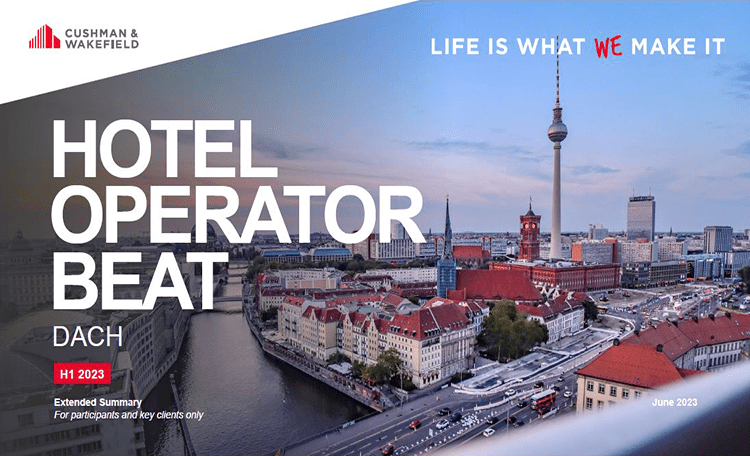

Hospitality is back – Optimism in the DACH region
28/08/2023
Josef Filser took over the position of Head of Hospitality Germany at Cushman & Wakefield during this turbulent period. Since the beginning of this year, he has been responsible for all transactions and lettings as well as strategic consulting mandates for the hospitality sector of the internationally active real estate consultancy firm in Germany. Now he takes stock - and has a closer look at the current state of the market at mid-year 2023.
Has the hotel market recovered from the slumps of the Covid pandemic as well as expected?
Josef Filser: The hotel market has actually recovered faster than expected. There was of course a lot of pent-up demand, but German holidaymakers do not seem to be saving on travel despite the high level of inflation. This also applies to the strong domestic tourism that characterises many regions such as the Baltic Coast and the Bavarian Alps and lakes. Occupancy rates there are also often above pre-crisis levels. Business tourism, on the other hand, which continues to play a significant role in many major cities, is still lagging behind pre-pandemic levels. Due to the weak economic outlook and the increasing importance of more sustainability in business travel, I doubt whether demand here will recover 100%.
Reporting of ESG key figures, pandemic clauses etc. - contracts are becoming increasingly complex. Will this reduce the attractiveness of hotels as investment assets?
Josef Filser: The new clauses do indeed make the contracts more complex, but also more transparent and better assessable in terms of risk profile. The contracts also reflect the increasing complexity of investor requirements. This applies in particular to the reporting of ESG KPIs, but also, for example, to the regular reporting of operational key figures. These new clauses are thus seen as an advantage compared to old contracts, where many current issues around sustainability and transparency are not considered.


Berlin, Hamburg, Munich and Vienna remain the locations most favoured by hotel operators in the DACH region. However, the strong domestic markets of Leipzig and Dresden have seen the largest increases in operator interest since last year. Why is this - and what can other regions learn from it?
Josef Filser: Dresden and Leipzig benefit from booming domestic tourism combined with solid business travel. Both are also only marginally dependent on international travel and, as a result, have seen a rapid recovery in demand and operating results post-Covid. Operator interest has increased accordingly. The successful combination of being both an attractive leisure destination and a solid business destination is something not all cities are currently achieving.
More Hotel Insights

Hotel investment market in the doldrums in 2023, but positive signals for 2024
Cushman & Wakefield recorded a total transaction volume of EUR 1.5 billion for the hotel segment in 2023. This corresponds to a decline of around 23 percent compared to the previous year and is the lowest result of the past eleven years, falling short of the 10-year average by around 60 percent.
Verena Bauer • 11/01/2024

Insights

Few transactions in German hotel investment market in first half of 2024
Cushman & Wakefield recorded a total transaction volume of EUR 470 million in the hotel segment in the first half of 2024. This represents an increase of 43% compared to the same period last year.